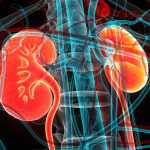 Colin Champ, M.D., pulls a Misfit Shine out of the cabinet above his desk. He’s also wearing one of the watch-shaped activity trackers on his left wrist. He has a mini basketball hoop hanging on his door, and a black kettlebell peeks out from beneath his desk. His interests are evident:
Colin Champ, M.D., pulls a Misfit Shine out of the cabinet above his desk. He’s also wearing one of the watch-shaped activity trackers on his left wrist. He has a mini basketball hoop hanging on his door, and a black kettlebell peeks out from beneath his desk. His interests are evident:
“I’ve always been into nutrition and fitness,” said the radiation oncologist at UPMC St. Margaret. And now, he wants to get a very specific group of people into fitness too.
Though it may seem counterintuitive, Dr. Champ thinks exercise could be one of the most important factors when going through radiation treatment. According to Dr. Champ, studies suggest that increasing activity levels during radiation treatment can actually lessen side effects, and decrease the chance of cancer returning in some patients.
To prove these benefits, Dr. Champ is piloting a study with 40 patients to measure activity levels with a Misfit Shine — which tracks sleep cycles, amount and vigor of activity, and calories burned — during treatment. He is selecting 10 patients with four types of cancer: breast, prostate, head and neck, and lung. The data will then be reported back to him through Koneksa Health, a clinical data company and partner with UPMC CancerCenter.
While Dr. Champ doesn’t expect or encourage his patients to run marathons, he says they aren’t limited in their physical activities.“I had a woman, she was 81, and she went to aerobic swimming three times a week during treatment. I just had a guy who had palliative radiation for lung cancer who was 92, also in water aerobics class three days a week. He didn’t let up at all.”
“We’ve told people to increase their activity levels forever, but now we actually have some way to quantify it. This is a golden opportunity to measure, and to get people to measure themselves,” said Dr. Champ, although, for this study, patients will not be able to track their own data, as that might skew the findings.
Dr. Champ hopes that study ideas and outcomes will be positive, and spread. He also hopes that fitness regimens could be prescribed in the future, just as hormones are prescribed after breast cancer treatment. Dr. Champ thinks that treatment could actually be a good opportunity to rethink lifestyle and habits.
“People get radiation for six weeks, or seven to eight weeks,” he said. “It’s the perfect time to start good habits for the rest of your life, especially if you haven’t been that active.”







